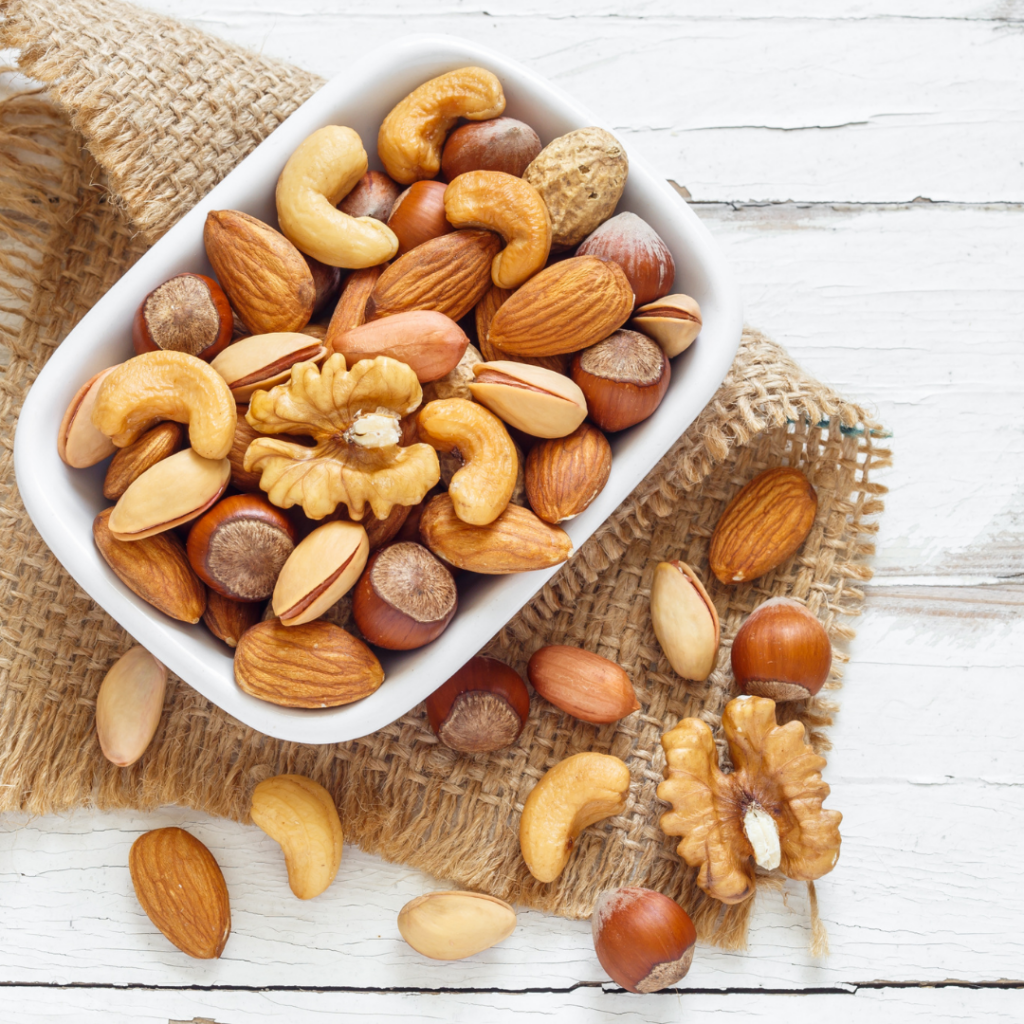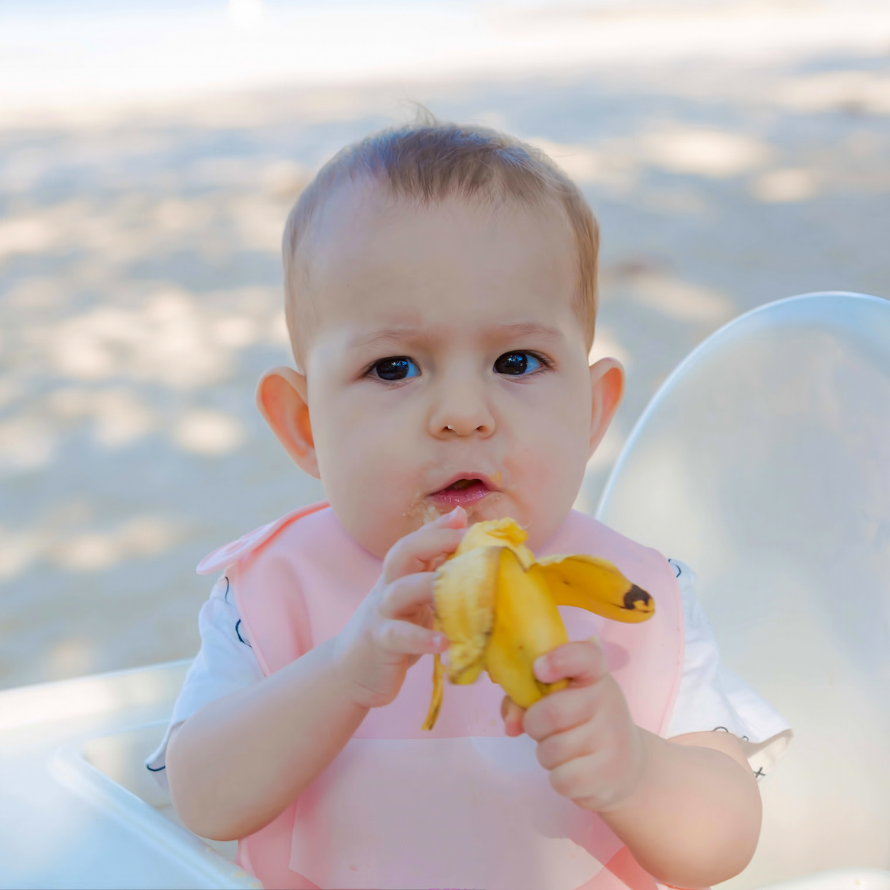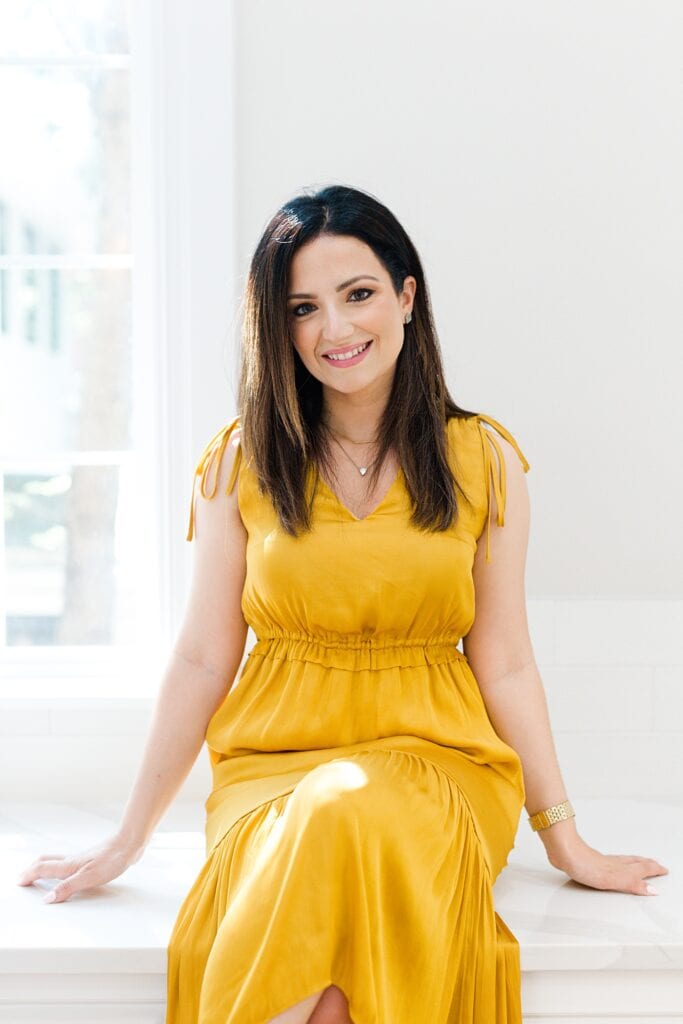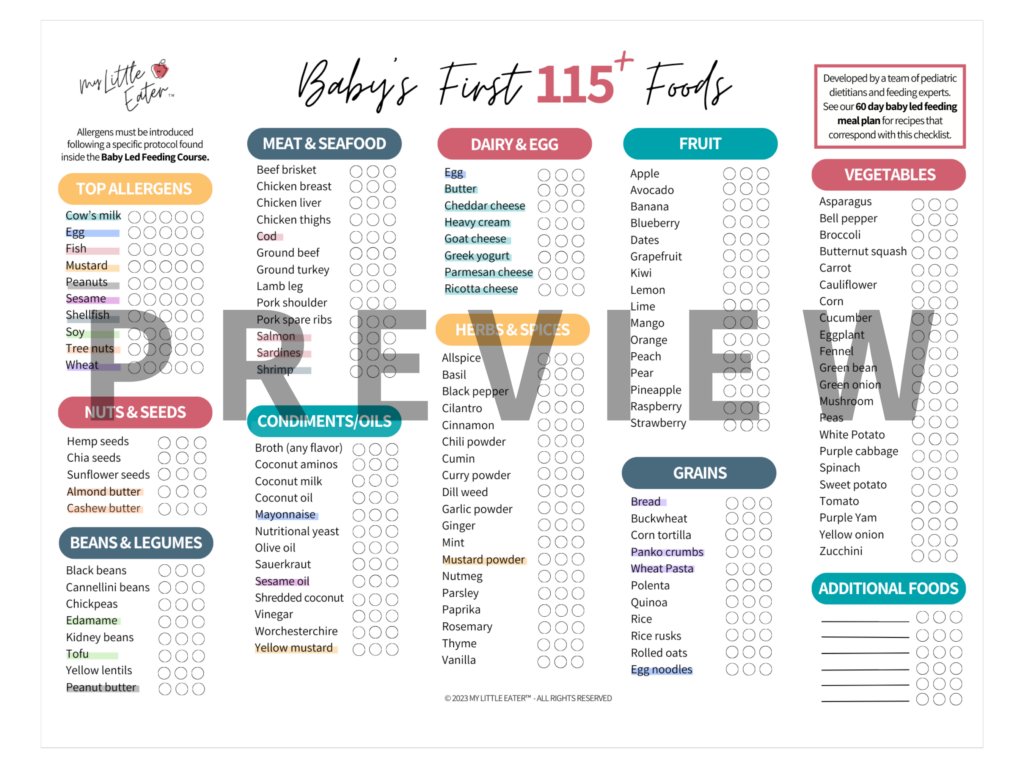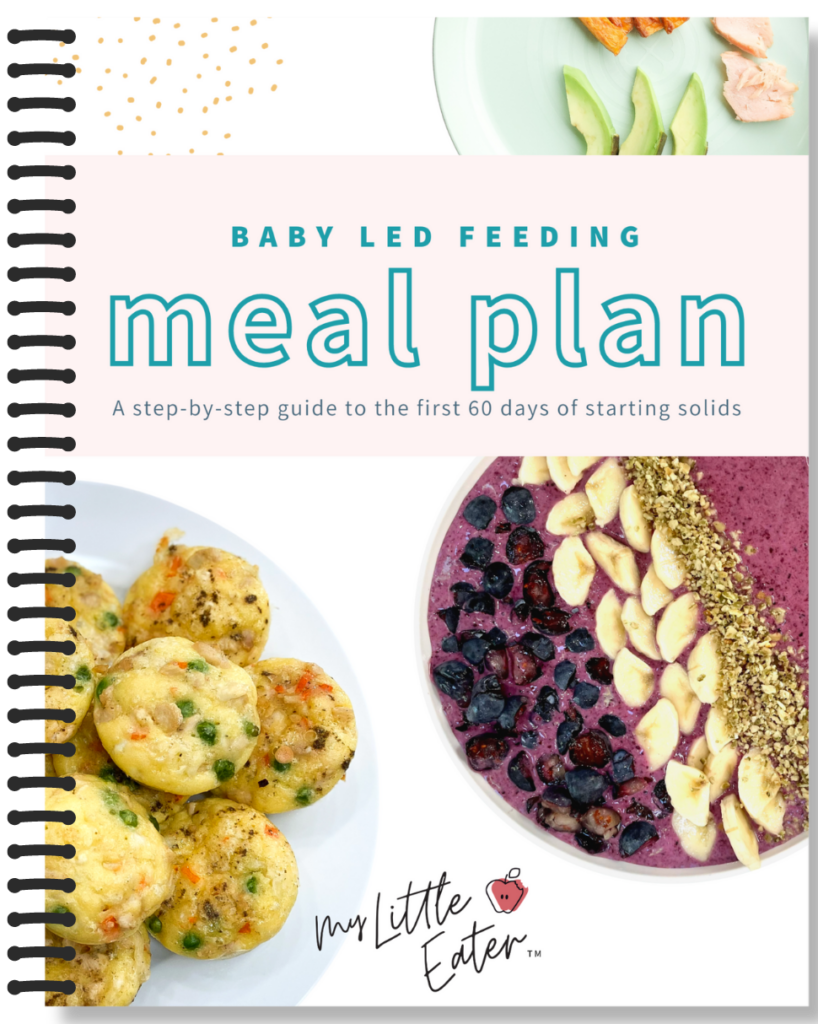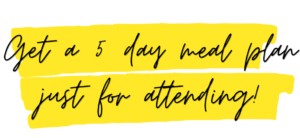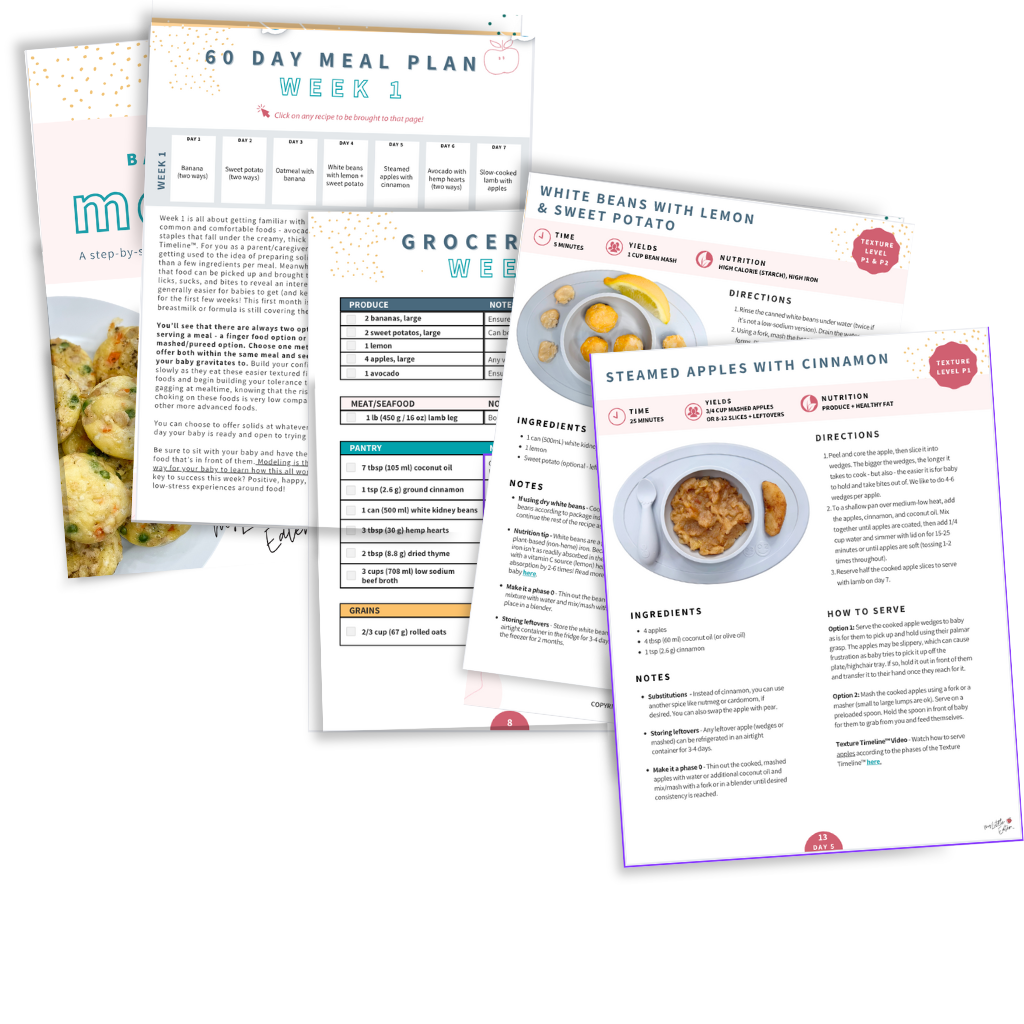- No Comments
- Chelsey Landry, RD
This post may contain affiliate links, please view our disclosure policy for more details.
Planning a holiday with your little one? We get it – the excitement, the anticipation, and of course, the worry about feeding your baby while on holiday.
If it’s your first time vacationing with your baby, you might be wondering about food allergies, water safety, and everything else that goes along with feeding babies. Oh, and don’t forget about packing all of the essentials!
We understand the struggle of trying to balance adventure and parenthood. Whether you’re a seasoned traveler or a first-timer, we’ve got you covered. Buckle up, because we’re about to embark on a journey together (pun intended!) to make sure you’ve got all the answers and a solid game plan for your upcoming family getaway!
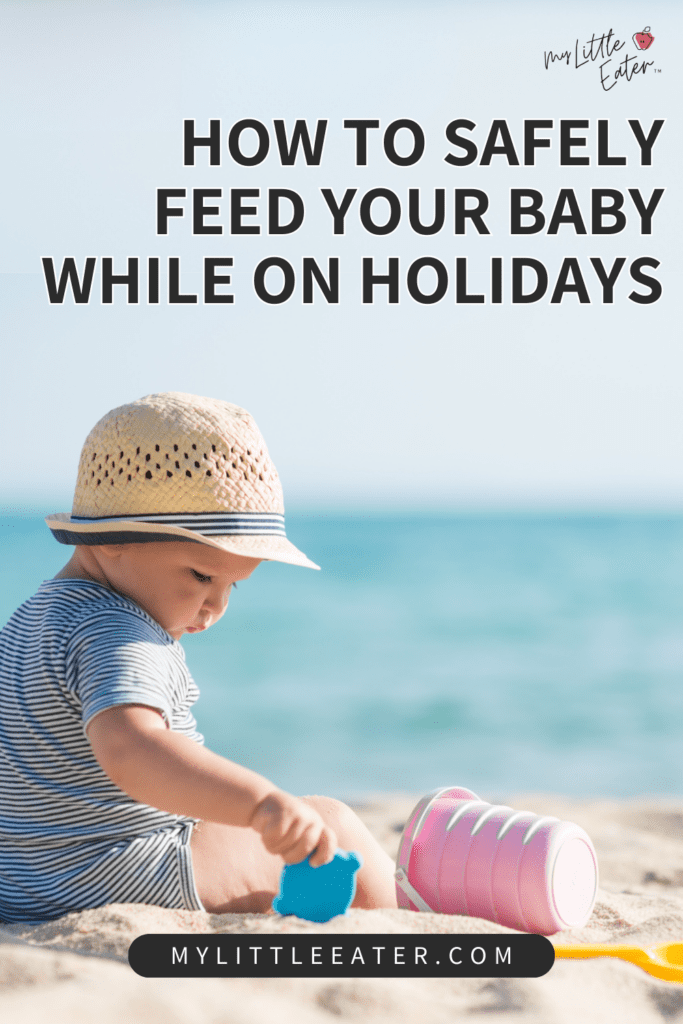
Table of Contents
Feeding your baby while on holidays is going to be a little different than feeding them at home. It will require a few considerations and modifications – so it’s best to be prepared! Planning ahead and having everything you need on hand is going to make everything so much easier and much more relaxed!
Whether you’re jumping on a plane or going on a road trip, your baby can still enjoy a solid food meal with the family. Let’s get right into our top tips for feeding your little one while on holiday!
8 tips for feeding your baby
while on holidays
1. Keep non-perishable food on hand
2. Choose a location with a kitchen
3. Scope out grocery stores and/or grocery delivery services
4. Share meals and sides with your baby at restaurants
5. Don’t completely ditch your feeding schedule (except maybe on travel days)
6. Don’t stress about how much baby is eating at every single meal
7. Don’t overpack
8. Relax and have fun!
We understand that these tips may be easier said than done. But don’t worry, we’ve packed this article with lots of practical and realistic suggestions for making them doable.
What to feed baby while on holiday
In general, your baby can eat most of the same things you eat while on holiday, just like they would at home. Don’t worry about feeding your baby perfectly balanced, healthy meals on vacation. It’s ok if it’s not perfect, you can get back to regular balanced meals once you return home.
No matter where you are in the world, there will be many foods your baby can enjoy like fresh fruits, vegetables, grains, meat, eggs, etc. Local foods may be prepared or taste a bit different, but don’t shy away from trying local foods that are baby-friendly. You might just discover your baby’s new favorite food!
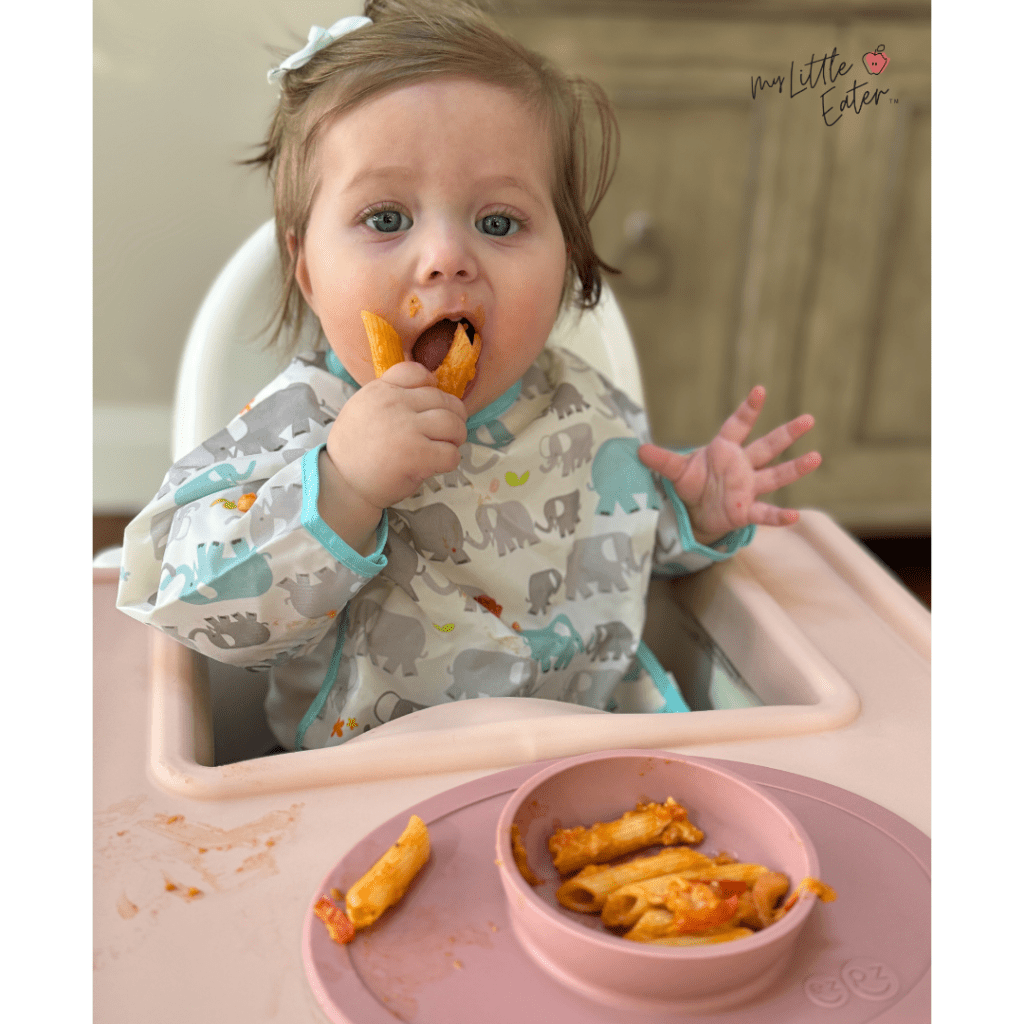
Don’t forget that your baby CAN have different herbs and spices! Let them try the flavors found in the local cuisine, but be mindful of spicy foods. If you’re somewhere that has a lot of spicy food on the menu, be sure to double check how spicy something is before offering it to your baby.
Keep non-perishable foods on hand
Whether you’re out and about or just need something to quickly feed your baby in a pinch, we recommend keeping non-perishable foods on hand while you’re on holiday.
Simple foods we recommend that don’t need to be kept warm or cold include:
- Canned foods (sardines, tuna, beans, etc.)
- Amara smoothie melts
- Apple sauce
- Amara textured puree mixes
- Infant cereal or regular oatmeal
- Pouches – the most convenient meal or snack out there! Our recommendation is to limit food pouches to once per day and only when you really need them (like on travel days)!
Learn more about easy and practical baby led weaning travel food ideas for babies 6 months & up.
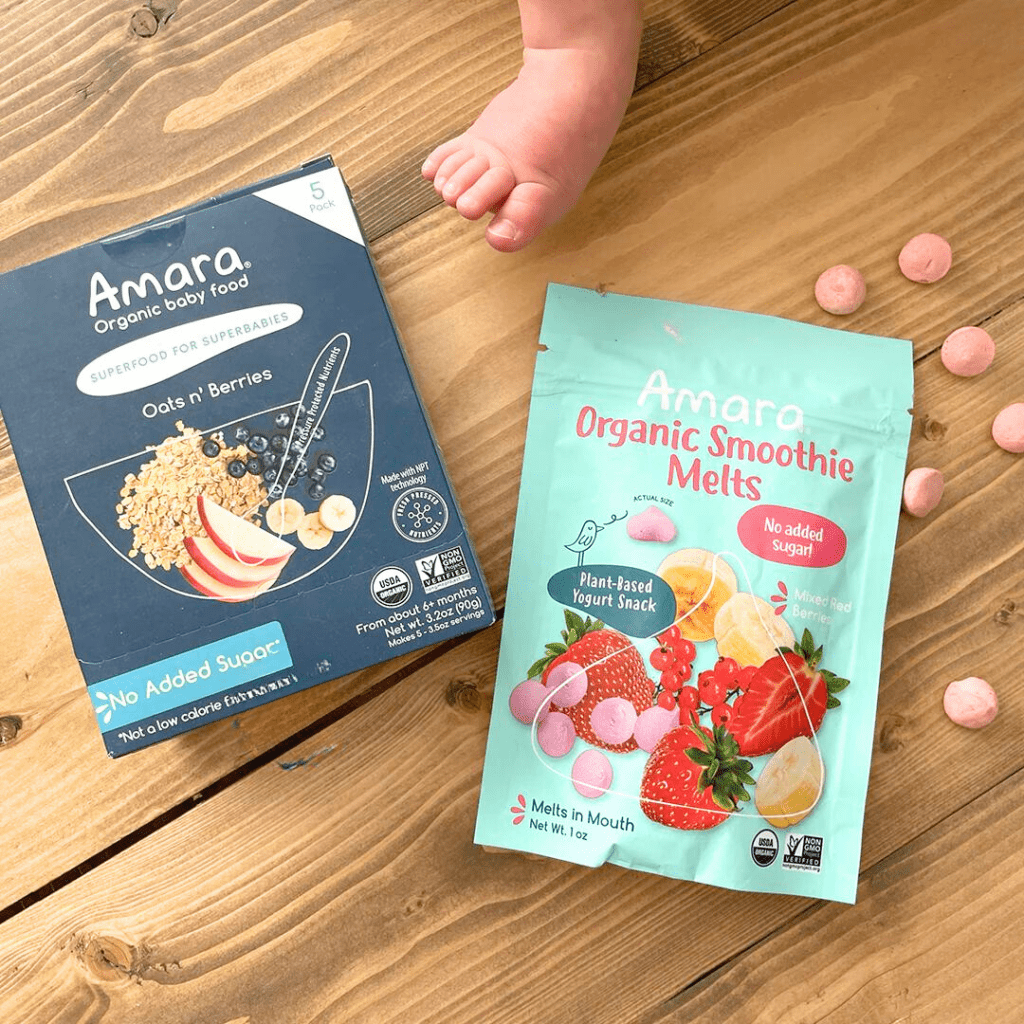
Scope out grocery stores in the area
If possible, choose a hotel room or rental that has a kitchen. This will make things so much easier if you need to prepare food for your baby. They may need to eat at certain times of the day when you can’t or won’t be at a restaurant, so this provides you some flexibility.
Aim for a fridge at the very least so you can easily store freshly expressed breast milk, formula bottles, and easy-to-offer foods like yogurt.
If you do have access to a fridge or full kitchen, spend some time researching the area you’re traveling to for local grocery stores. You can then plan to pick up food at the grocery store when you arrive. Alternatively, you can opt for a grocery delivery service. This means your groceries will be waiting for you upon arrival at your holiday destination!
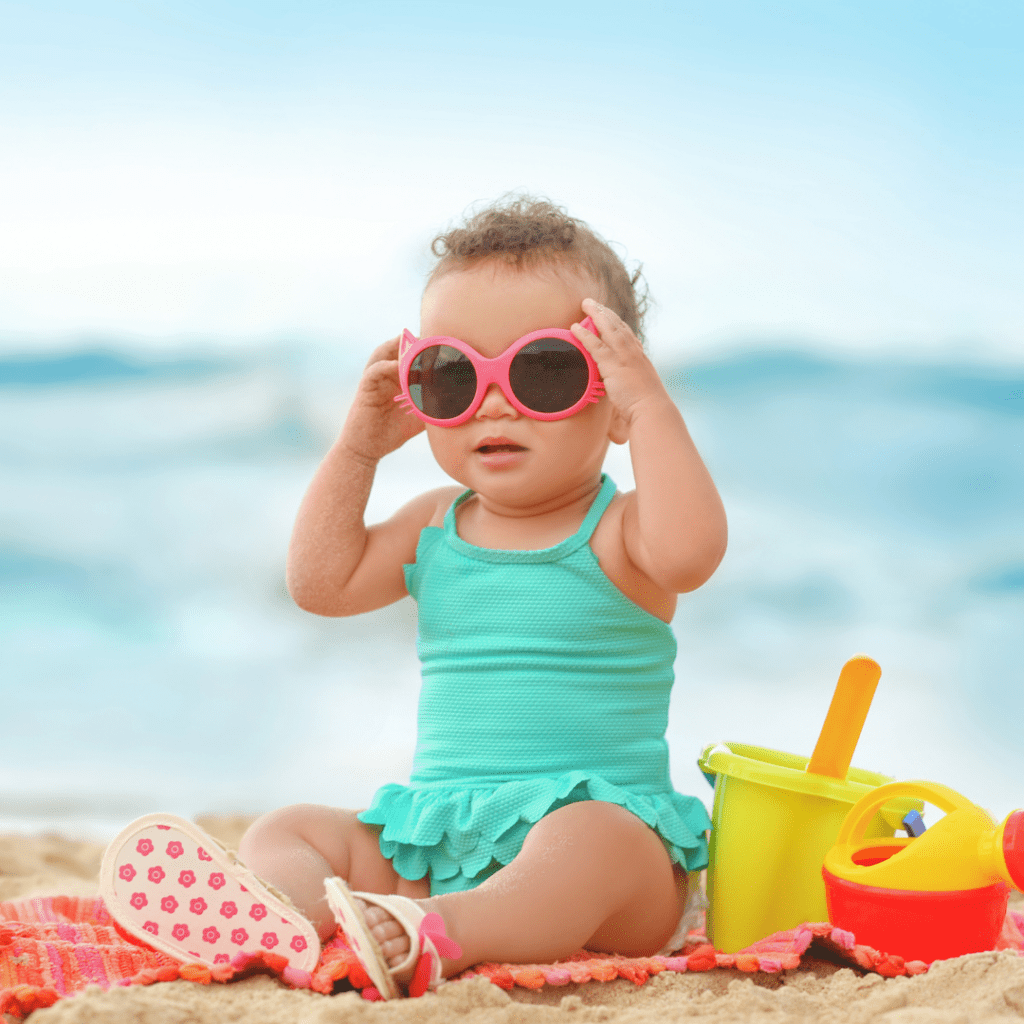
We also highly recommend that you get specific when you’re researching stores!
Does your baby need a specific formula? Check if stores nearby sell it because switching formulas can be difficult for your baby.
Does your baby have certain food allergies that make finding packaged foods (ie. pouches, baby food jars, etc.) more difficult? Check what’s available and decide how much you need to bring with you.
What foods can you take on a plane for your baby?
Generally, you can bring any baby-related food items on the airplane with you (in your carry-on or hand luggage) if you’re traveling with a baby. It’s typically acceptable to take formula, breastmilk, pouches, baby food jars, etc. In Canada, you have to be traveling with a baby to bring baby food with you on the airplane.
Regulations may differ depending on the country, learn more about regulations for travel in Canada and the USA.
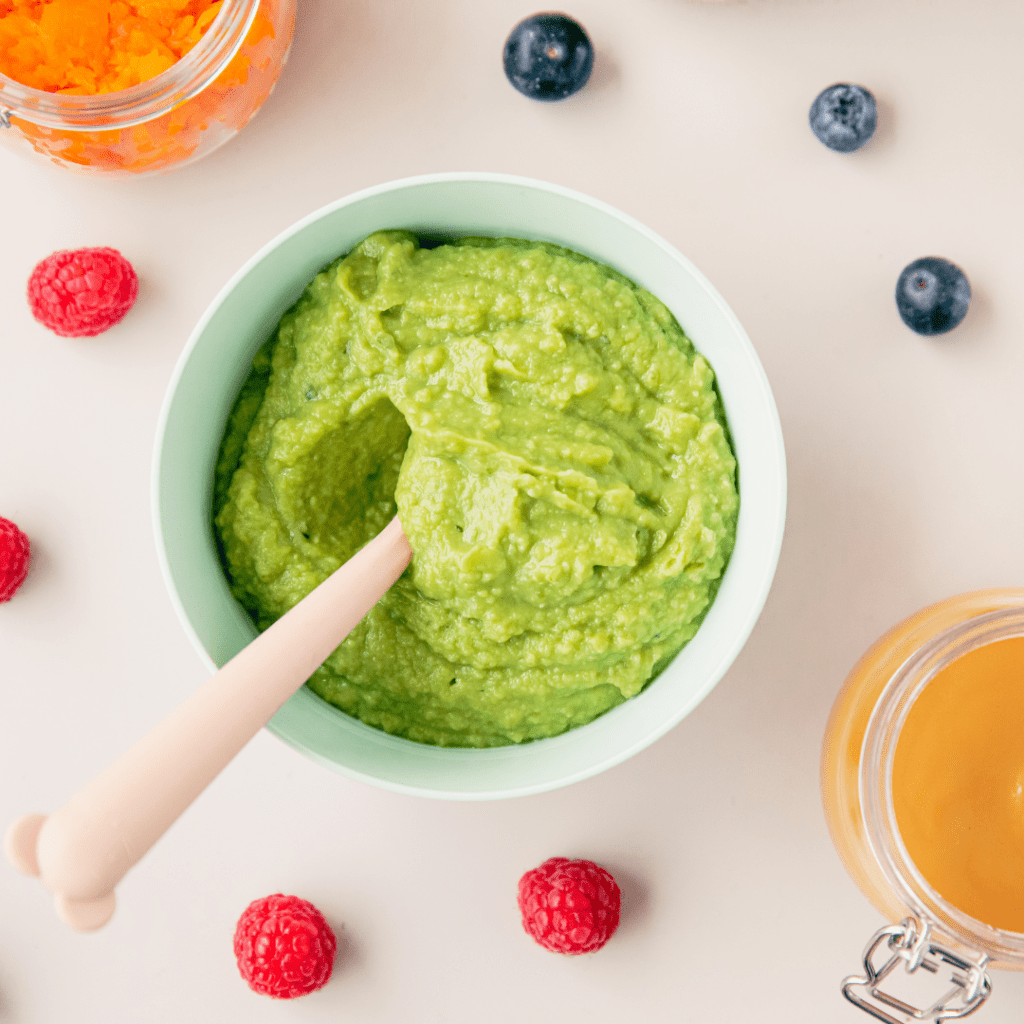
When packing food for a flight make sure you bring familiar foods that you know your baby likes. This will help eliminate any potential travel stress from introducing something new just to have your baby refuse to eat it. Avoid offering disliked foods, new foods, or introducing top allergens for the first time.
Pack extra non-perishable food items for your baby in case of flight delays and opt for travel-friendly, mess-free foods. We recommend avoiding or minimizing the following:
- Broth or very thin, liquidy sauces that don’t stick easily to a spoon (like 0% regular yogurt)
- Things that stain easily (ie. beets or cherry tomatoes)
- Super crumbly food that falls apart easily (think loose rice!)
If you’re going on a long flight, you can call the airline ahead of time and ask about what foods will be available for purchase on the plane. Airlines usually have multiple food options available, but checking to make sure they can be easily modified for your baby’s safety is important.
How much breast milk or formula is allowed on a plane?
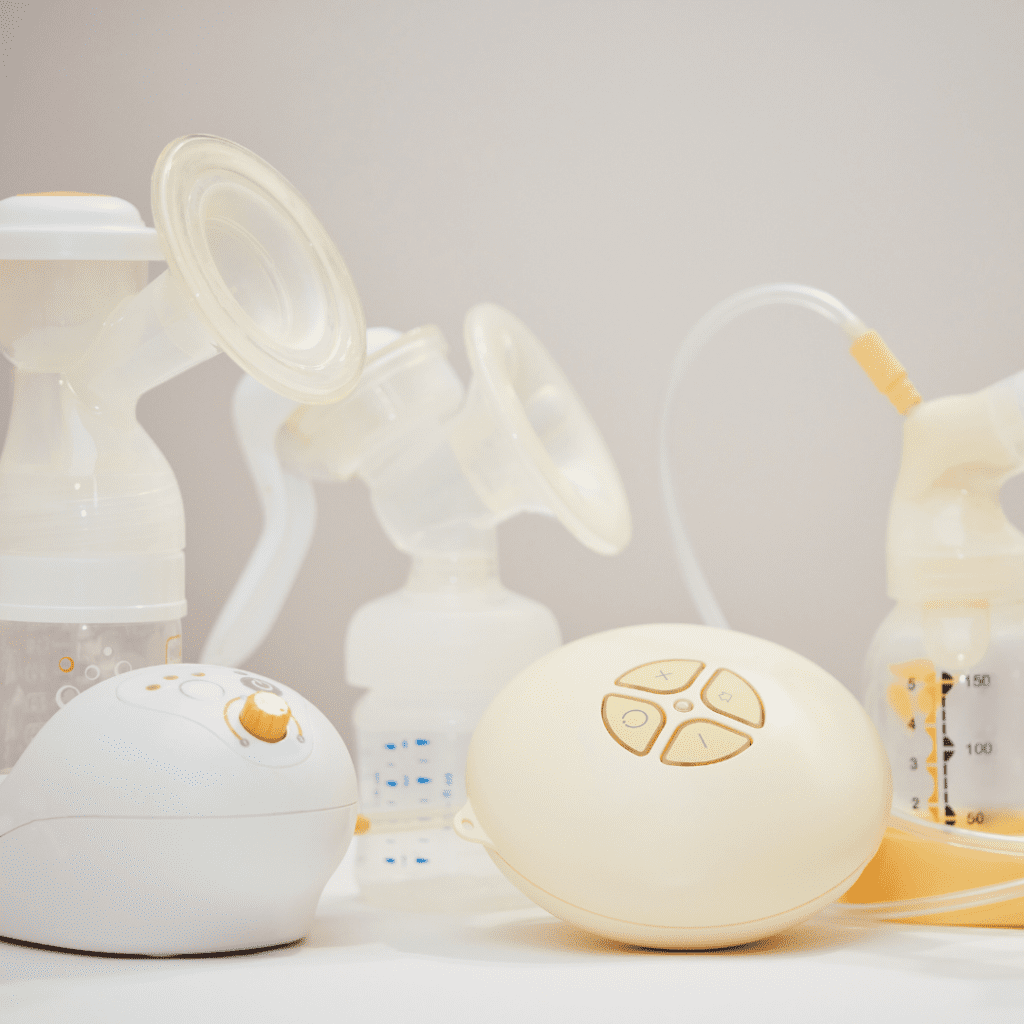
There are no restrictions on how much breast milk or formula you can bring with you on the plane. You can even carry on breast milk without your baby being present (this allows you to keep up your milk supply if traveling without your baby).
As mentioned above, you will want to confirm regulations with your country or the country you’re traveling out of because specific details may vary. Know your rights and have the regulations saved on your phone in case anyone at security gives you pushback. We hope this won’t happen, but unfortunately, it’s not unheard of.
One consideration to make is that you can’t premix baby formula at home and bring it on the airplane. You will have to mix the formula with bottled water once you board the plane or are in the airport and your baby is ready to eat.
This is because once baby formula is mixed it only lasts at room temperature for up to 2 hours, so you definitely wouldn’t want to mix it while packing and serve it hours (or even a day) later at the airport.
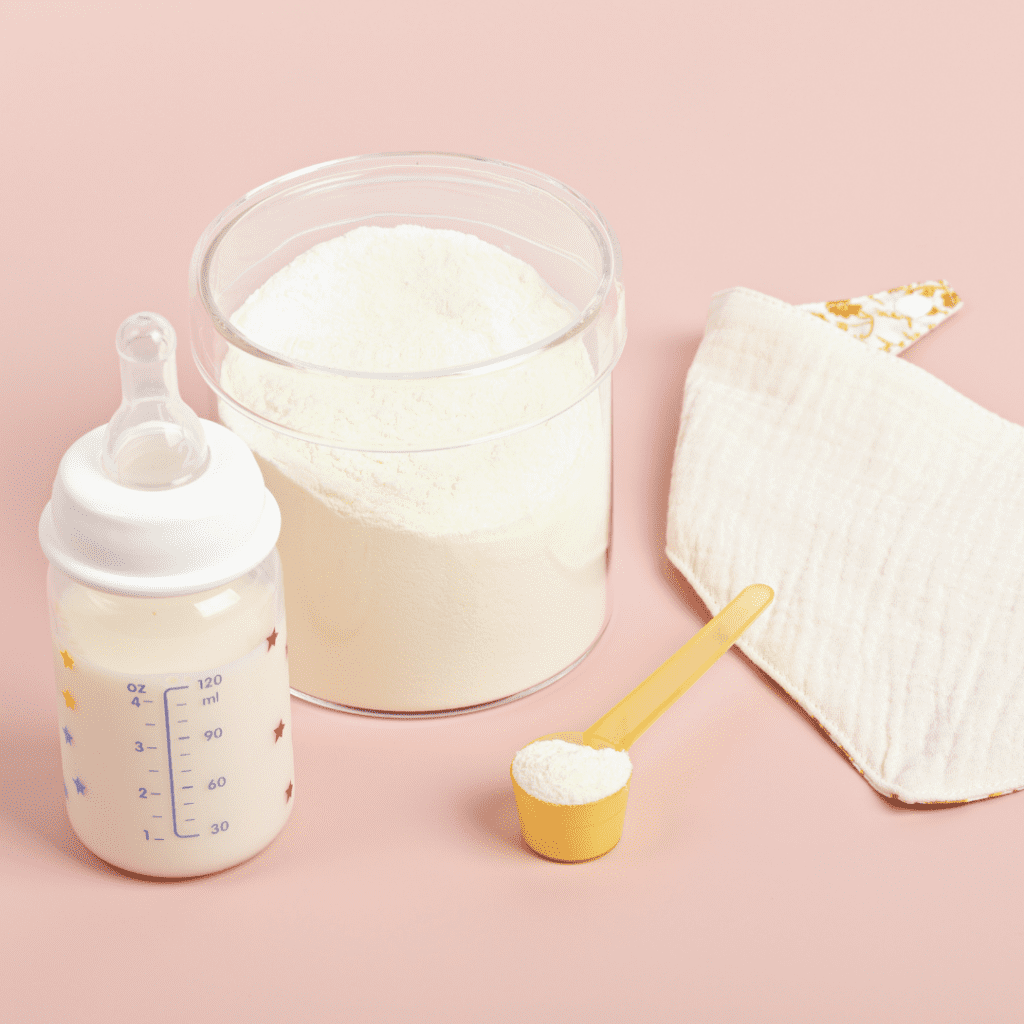
Be sure to measure the water ahead of time in your baby’s bottles to make this easier. That may have to be done after going through security but it will be easier in the airport compared to on the plane.
Alternatively, you can pack a pre-prepared formula, some brands have ready-to-serve options. However, you do want to make sure you’re packing something your baby is used to or has had before to avoid any refusals or tummy upsets while getting used to something new.
MLE Bonus Travel Tips
Don’t forget ice packs, freezer packs, or frozen gel packs in a cooler bag to keep freshly expressed milk (or frozen milk) cool on the plane.
Double bag your breast milk in case of a leak! Place your milk in containers or larger Ziploc bags for extra protection.
How to feed your baby solids on a plane
The first thing you need to consider is getting your baby into a safe position for feeding. Airlines typically recommend babies sit in a car seat, in their own seat. If your baby is in a car seat, you will need to take them out to feed them.
Car seats won’t allow your baby to be in the correct position for feeding because they aren’t fully upright. This means that their airway isn’t fully open, which can increase their risk of choking. The same is true if you’re traveling with a baby by car.
Learn more about safety tips when feeding your baby on-the-go.
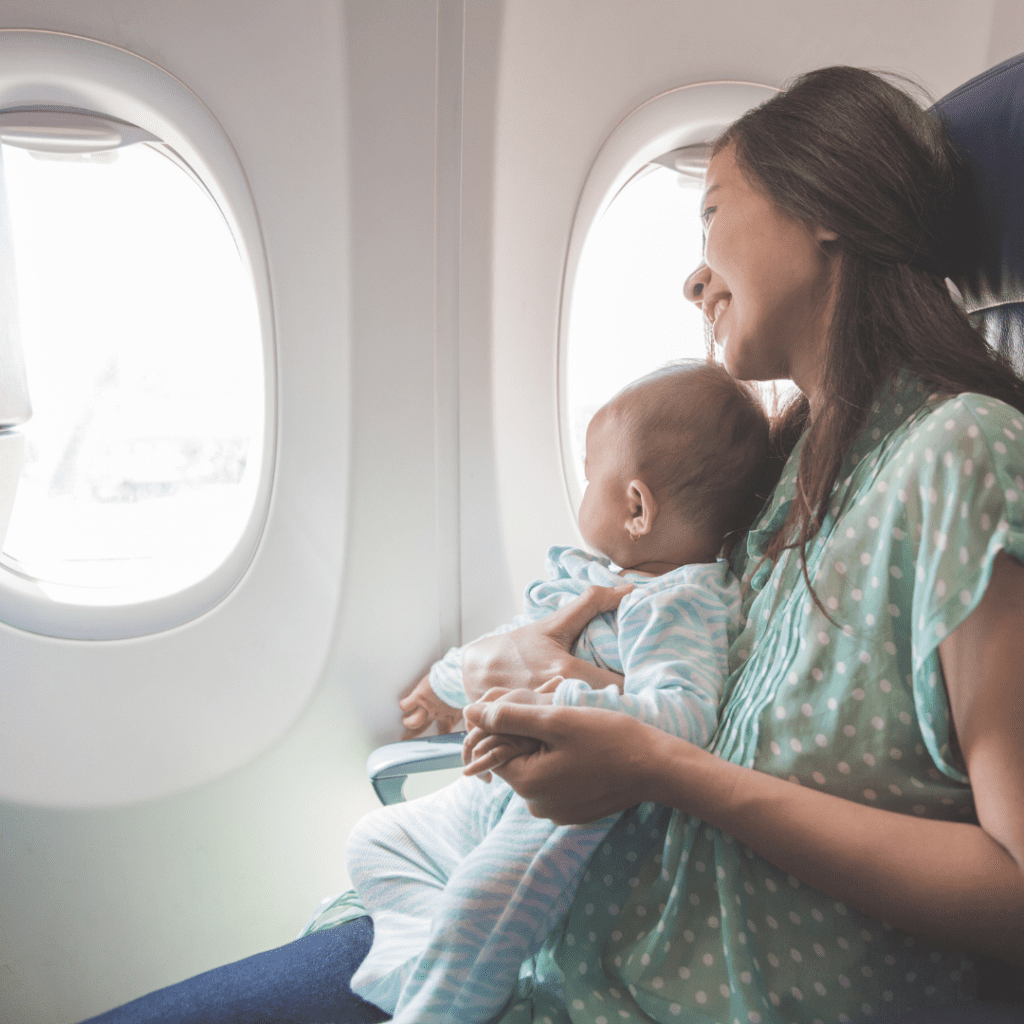
If you’re traveling with someone else, it’s safe to seat your baby on the other person’s lap and feed them solids that way, provided the fasten seatbelt sign isn’t on. When offering solids, ensure your baby is facing you and is sitting up straight.
All that said, we recommend feeding your baby in the airport prior to boarding when possible (or feeding at home before/after traveling). Depending on your flight, you may not be able to safely feed your baby solids during the journey. For example, if there is a lot of turbulence and the fasten seatbelt indicator remains on throughout the flight.
In these cases, it is recommended that your baby be strapped into a car seat, and if they don’t have their own seat, holding them close to your chest will be safest for them. We wouldn’t recommend offering solids while the plane is going through a lot of movement due to turbulence anyway, as it could increase the risk of choking.
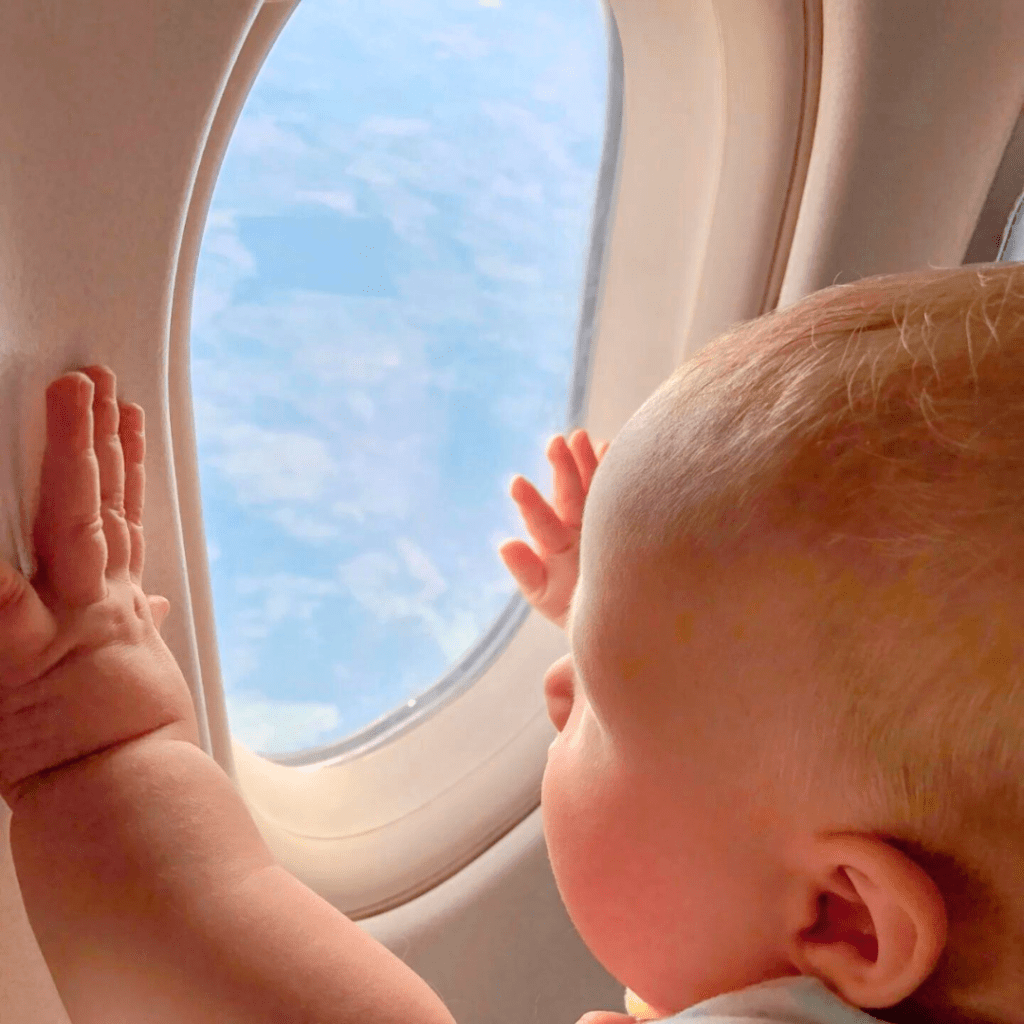
MLE Bonus Travel Tips
Avoid early boarding! Unless you really need the extra help boarding the plane you don’t want to be the first one on, especially for longer flights. Your baby will get restless on the plane and you don’t know how much you’ll be confined to your seat due to the fasten seatbelt sign.
The longer you can keep them in the airport where you can walk and rock them freely, the better. Typically those needing extra assistance are last to de-board as well, so if you were the first ones on you could be adding up to an additional hour to your flight time.
During take-offs and landing, encourage your baby to do a sucking motion to help their ears pop. This is because the change in pressure when at a higher altitude can be painful for your baby if their ears don’t pop.
To encourage a sucking motion, you can offer a soother or teethers for them to suck on. During take-offs and landings, your baby has to be upright against your chest for safety, so you will likely not be able to breastfeed or offer a bottle.
Food safety when traveling to an all-inclusive
Babies can eat most foods offered at an all-inclusive including fruit, steamed veggies, eggs, chicken, beef, potatoes, toasted bread, yogurt, beans, pasta, and so much more!
However, there are a few considerations and things you’ll want to avoid when it comes to food safety for your baby at an all-inclusive, including:
- Avoid fresh fruit that has already been cut. Fruit peels can harbor a lot of bacteria if they’re not washed or stored properly. When unwashed fruit is cut into pieces, all the bacteria on the outside of the fruit contaminate the inside of the fruit. Fruit with a peel that you can remove on your own (like bananas or oranges) is safe.
- Avoid buffets if possible. When food is served buffet style, there are a lot of people touching, talking (spitting), coughing, sneezing, and cross-contaminating the food. You also can’t be sure of when it was cooked and therefore how long it’s been sitting out. We recommend asking for your food to be cooked by the chefs (usually someone is at the grill who can cook food fresh in front of you).
- Avoid serving baby undercooked meat, seafood, or eggs to prevent food-borne illness. This one goes for when you’re at home too!
- Stick to bottled water for your baby and refrain from using ice cubes to keep their drinks cold.
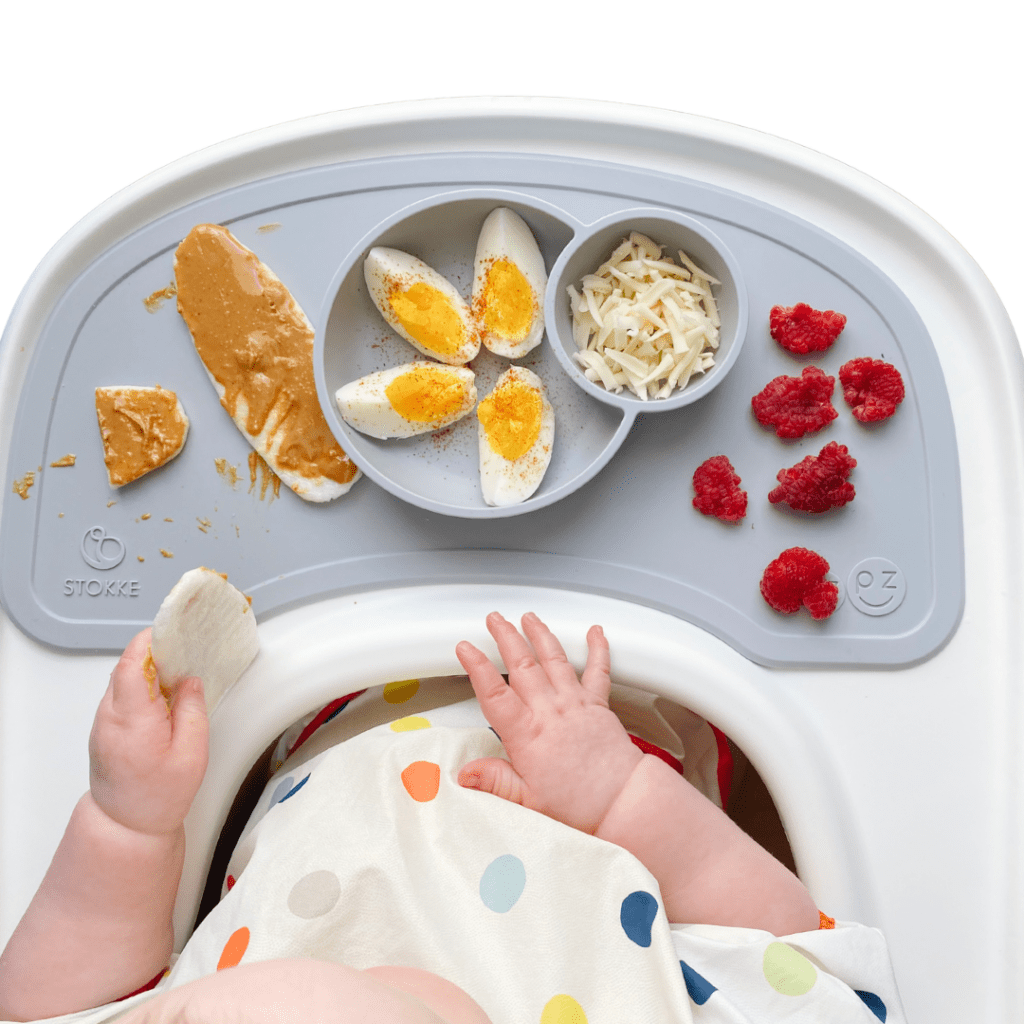
This isn’t being over-protective. A baby’s immune system is not as well-developed as an adult’s. Therefore, they are more susceptible to food-borne illnesses, and the symptoms can be more severe.
MLE Bonus Travel Tip
Bring infant cereal or oatmeal to make as a quick meal. You can make it in a hotel room (no kitchen needed) with just boiled kettle water. It also travels well so you can put it in a thermos, and pack it with you if you’re going out and about for the day!
Eating at restaurants with your baby
This might feel like one of the most daunting parts of vacationing with your baby!
The first tip we can give you is to share parts of your meal or extra sides with your baby instead of ordering them their own food! This way they’ll get more exposure to different foods, flavors, and textures. Plus, most babies will not be able to finish a full meal off the kid’s menu, so it cuts down on food waste – a win-win!
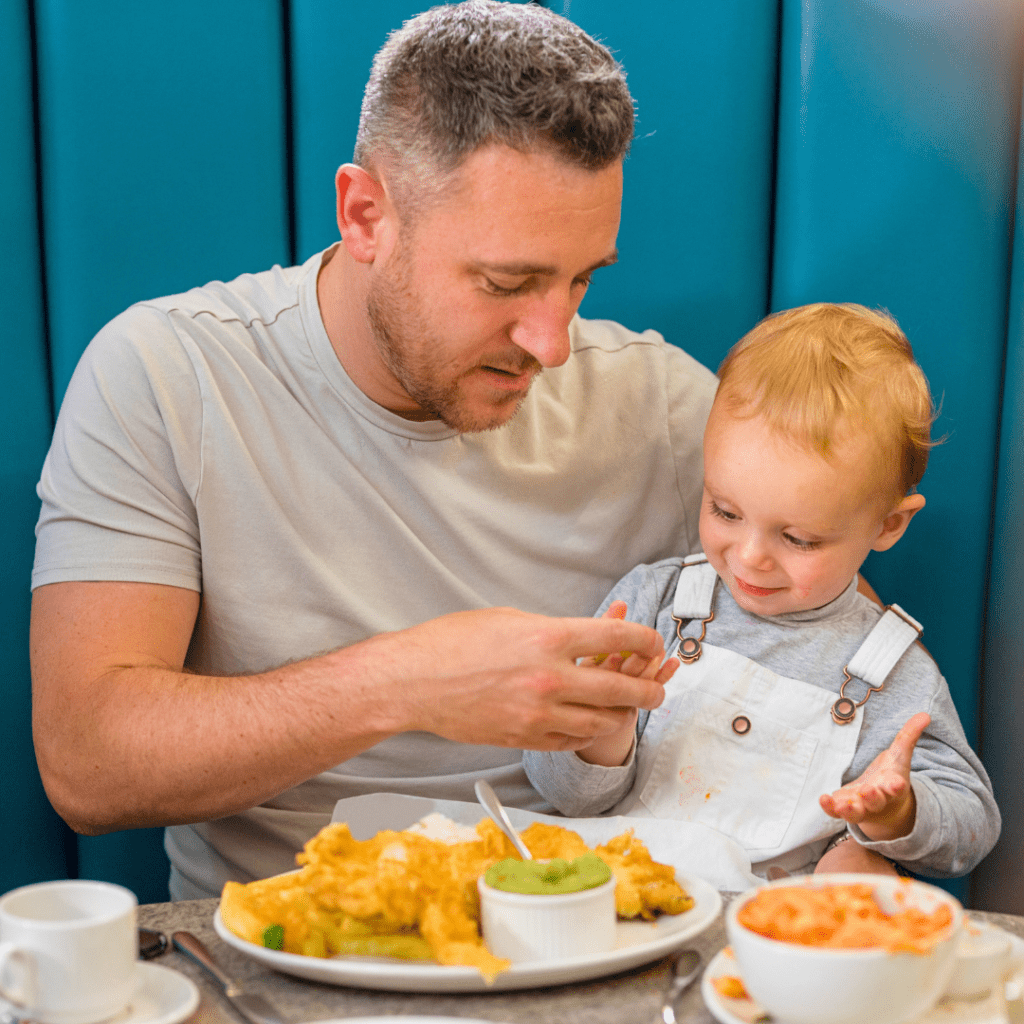
We know you’re likely also concerned about the added salt and sugar in most restaurant dishes. While that certainly is a valid concern, allowing your baby to be part of family meals is much more important (and beneficial) than refusing to serve your baby a meal because it has salt added to it.
A little bit of sugar or salt is ok and isn’t going to be the end of the world. We don’t want you to stress too much about this – you are on vacation after all and it should be as stress-free as possible!
If you’re concerned that they’re getting too much added salt or sugar, here are some suggestions that may help with limiting those for your baby:
- Ask for your child’s portion to be unsalted.
- Ask for sauces and dressings to be on the side.
- Remove the skin off of chicken (for safety and also this is where most of the salt would be).
- Ask before ordering if pasta sauces, soups, etc. are made in-house or canned and come from a manufacturer. Non-housemade items are bound to have exponentially more salt and sugar.
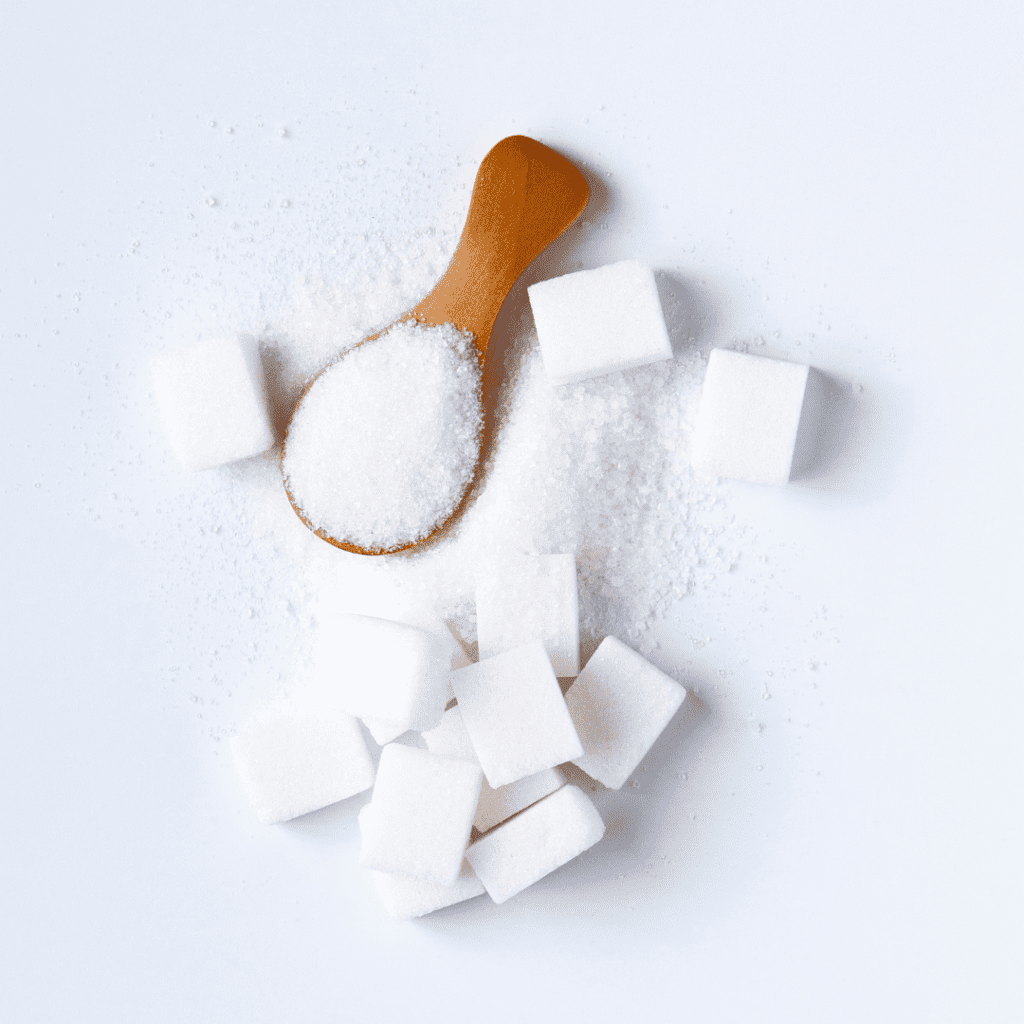
And finally, pack some of those non-perishable food items you brought with you on your trip for the restaurant! You may need these to keep your baby happy and occupied while you wait for the delicious food to arrive. Toss some simple toys in your diaper bag for an easy distraction too!
Read all of our tips for eating out with babies (and toddlers) so you know what to pack, how to keep them safe while there, meal ideas you can try ordering, and how to make the experience enjoyable for all of you!
Feeding schedules on vacation
Although we always recommend sticking to your regular feeding schedule, travel days could make that very difficult or nearly impossible!
You may even have a fussy baby that doesn’t want any solids at all (that’s OK)! It’s also true that as the parent you might not have the capacity to offer solids during a hectic travel day, and honestly, we get it.
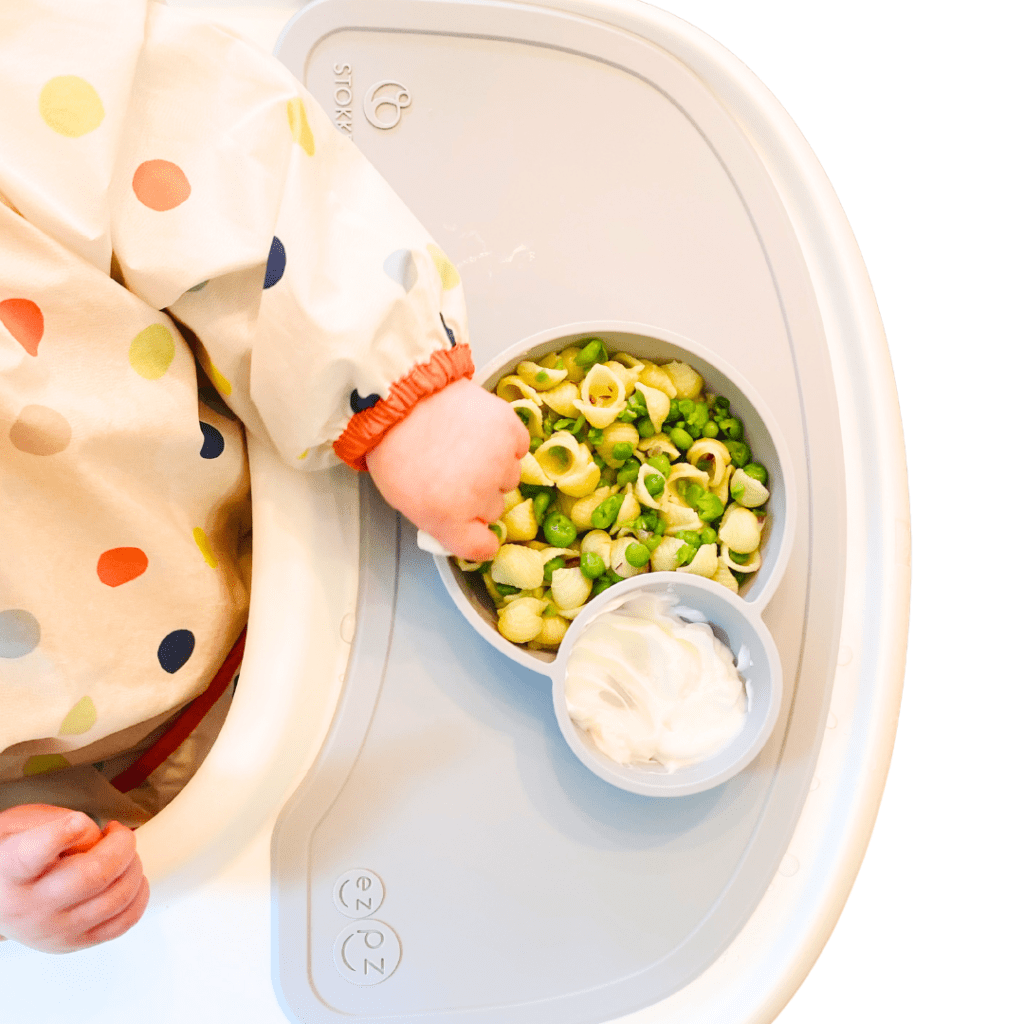
What’s more important is that you do your best to offer solid food meals and milk feedings spaced out at regular intervals when you reach your destination, similarly to how you would at home.
And don’t worry about how much your baby is eating at every meal while on holiday!
They’re in a different environment that they’ve never seen before. Understandably, eating may not be high on their list of priorities – there’s lots of exploring to do! If your baby is off schedule and fussy, this can impact their willingness to eat solid foods too. They may end up skipping a meal here and there. That’s very normal and OK!
MLE Bonus Travel Tip
Time differences can affect babies just like they affect you. Be mindful that this can impact their sleep and make it very difficult to stick to your normal routine or feeding schedule. Focus on offering the same number of meals and keep an eye on the gaps between milk feedings and solid foods.
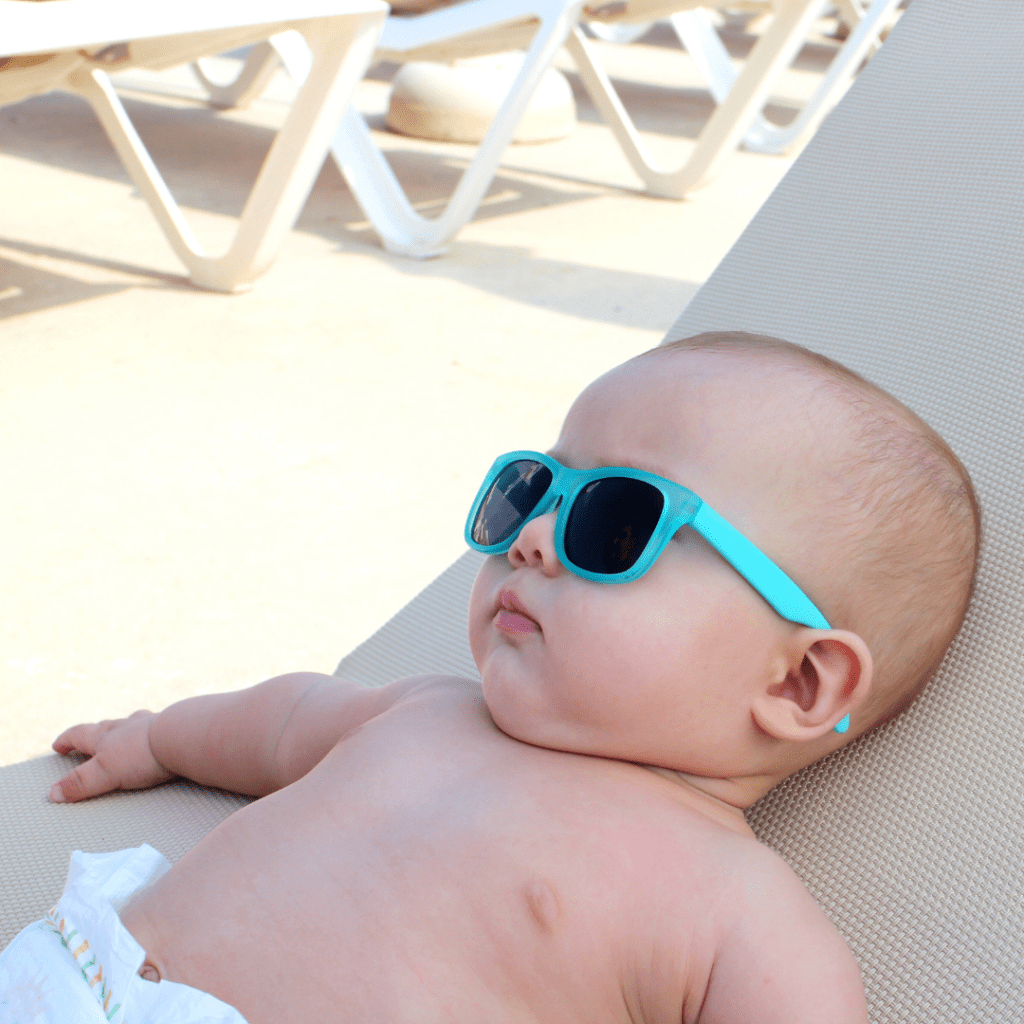
Can I skip solid foods on travel days?
In the beginning stages of starting solids, between 6-7 months of age, your baby will only be having 1-2 solid food meals per day. At this point, it’s definitely ok to skip solids on travel days!
Once your baby is up to 2-3 solid food meals per day, around 8-9 months, this will be a bit more difficult and you may see them getting fussy around mealtime.
Again, it is best to stick to a feeding schedule as much as possible. Try squeezing in at least one meal before or after travel to avoid offering while busy at the airport or during a long car ride. Even if they’re eating 2-3 meals per day, having at least one may help them be more ok with skipping the others if they have to.
The bottom line is that if you can’t offer solids for a day due to travel, it’s not a huge deal and you’ll get back on track the following day!
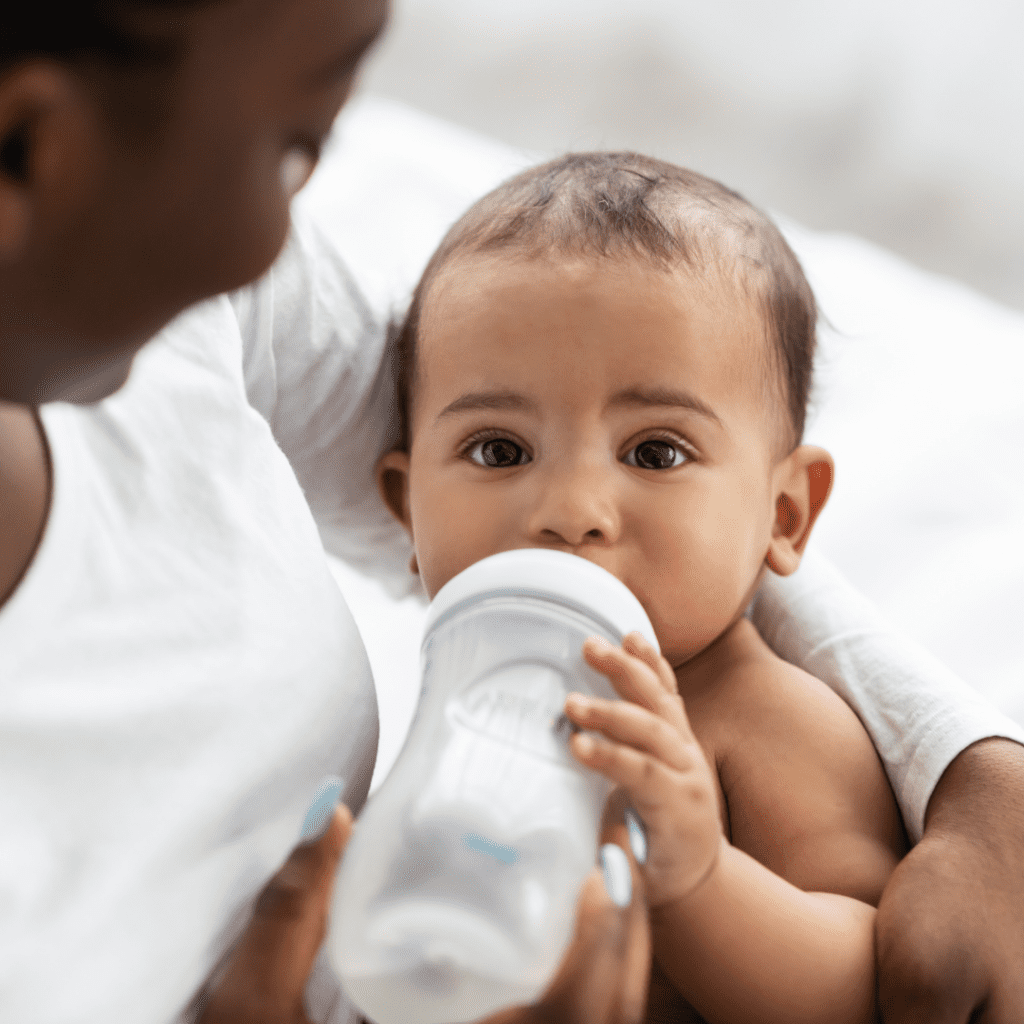
We recommend being prepared for both scenarios. Pack solid food options even if you think you won’t use them. Your baby may love traveling and be totally fine with eating solids on the go, so be prepared to offer some.
But also be ready for if your baby just isn’t into it. In this case, especially if your baby is older and started to drop some milk feedings, make sure you pack enough formula or expressed breast milk or be prepared for more nursing sessions. If they skip solids, they’ll likely be interested in more milk feeds and you don’t want to be in a situation where you run out.
MLE Bonus Travel Tip
Make frequent stops during long car rides even if you don’t plan on offering solid meals. It’s important to get them out of their car seat to stretch, move around a bit, and for milk feeds.
What to pack for feeding your baby while on holiday
Bringing simple feeding gear can be helpful when on holiday to make eating easier for your little one and to help contain some of the mess!
Without going overboard on baby supplies, some things you’ll want to include in your travel bag are:
- Their favorite utensils (our top recommendation is a Num Num Gootensil)
- Bib (we suggest long-sleeved bibs for keeping clothes clean!)
- Straw cup (we like the munchkin weighted straw cup for travel)
- Optional: Suction plate (we like Oxotot and EZPZ mini mat). Food can be put directly on a high chair in most cases.
- Optional: A portable high chair. We suggest checking with resorts and hotels to see if they have options you can use while there. If you’re driving and know you’ll be eating mostly at restaurants, you likely won’t need this and depending on the space you have available may want to leave it at home.
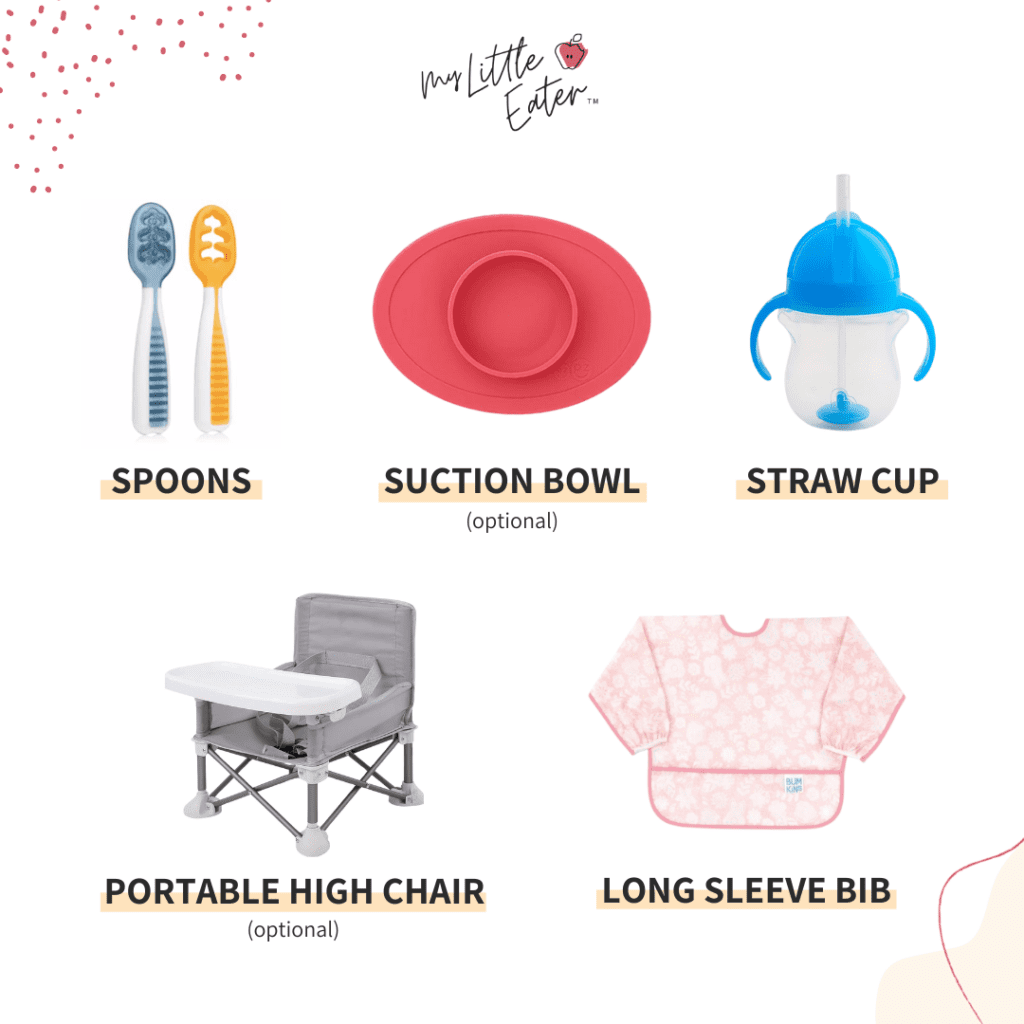
There will be a mess and that’s ok (ignore the stares). Some other items we recommend bringing to help with the clean-up afterward are:
- Plenty of baby wipes!
- A change of clothes
- A large (freezer-sized) Ziplock bag or reusable wet bag for dirty clothes, wipes, plates, cups, fallen food, etc.
- A small container of dish soap to clean bottles, cups, utensils, etc. at the hotel room (a tiny Tupperware container works well for this!)
Frequently asked questions
If baby turns 6 months while on holiday, do they start solids?
No, you do not want to start solids while you’re away on holiday. It’s best to wait until you get back home and settled. Starting solids on holiday will be much too distracting and overwhelming, plus there’s a possibility that your baby could have an allergic reaction.
Delaying the introduction of solids by a few days or even a week isn’t going to be an issue in the grand scheme of things. So relax and enjoy your holiday, and tackle the new journey of starting solids once you’ve returned home!
Can I postpone allergen introduction while on vacation?
Yes, you do not have to stress yourself out and worry about introducing allergens to your baby while you’re on holiday. In fact, it’s safer to wait and introduce allergens once you’re back home in case your baby does have an allergic reaction and you need to seek medical attention.
What if my baby has an allergic reaction in another country?
Before you go on holiday with your baby, locate the hospital nearest to you just in case of an emergency. Just as you would if you were at home, if your baby is having a severe allergic reaction, you’ll want to call 911 immediately and seek medical attention.
We also recommend speaking to your insurance provider about medical coverage if traveling to another country. You’ll want to have something in place for everyone, including your baby.
Does my baby need to drink more water to stay hydrated?
Babies can get dehydrated, just like adults, if they’re out in the heat for prolonged periods without proper hydration.
If your baby is under 6 months of age, all of their hydration needs will be met through breastmilk or formula. Prepare to offer extra milk for hydration in hot weather in between feedings as needed.
Between 6 to 9 months of age, your baby can have sips of water up to a maximum of 4 oz per day. And between 9 to 12 months of age, your baby can have up to a maximum of 8 oz per day.
Offer small sips of water in between milk feedings and at mealtime to keep your baby hydrated throughout the day. Keep a straw cup with water on hand if you’re out and about with your baby!
All that to say, we don’t want you to stress about all of the little things while you’re on holiday. Remember – a little extra salt or sugar, being off schedule, a skipped meal, or forgetting your baby’s favorite spoon isn’t worth stressing over. It’s only temporary.
After all, you are on holiday to relax and have fun with your family!
IS THIS HELPFUL? PIN IT TO SAVE FOR LATER!
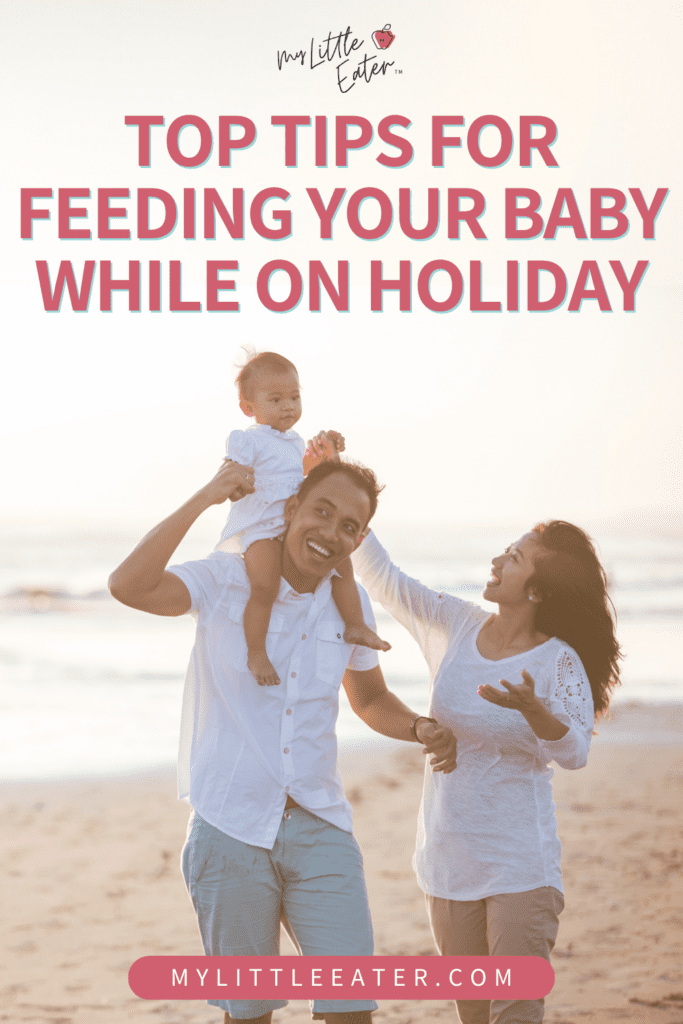

Chelsey Landry, RD
Community Dietitian at My Little Eater Inc., and bunny-mom to Hickory. Chelsey offers one-on-one counselling to parents of babies and toddlers that need more customized support. Learn more by booking a free discovery call with her today!

Chelsey Landry, RD
Community Dietitian at My Little Eater Inc., and bunny-mom to Hickory. Chelsey offers one-on-one counselling to parents of babies and toddlers that need more customized support. Learn more by booking a free discovery call with her today!
